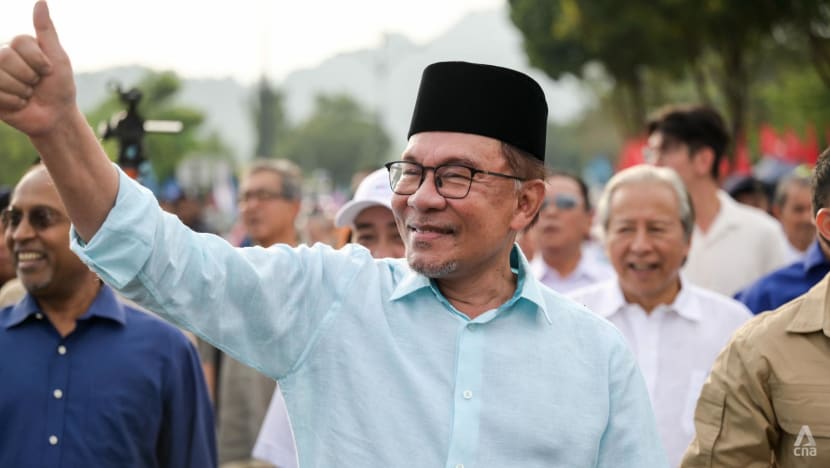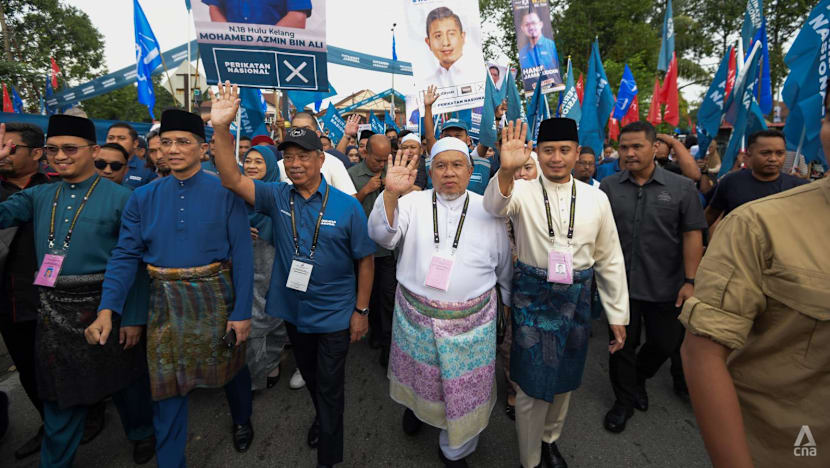Election battle lines drawn in 6 Malaysian states, with polls seen as litmus test for Anwar's unity government
More than 9.7 million Malaysians are set to go to the ballot boxes on Aug 12 in Selangor, Kelantan, Terengganu, Negeri Sembilan, Kedah and Penang to vote for lawmakers in the state assemblies.

KUALA LUMPUR: Six states in Malaysia will see two intense weeks of campaigning which kicked off on Saturday (Jul 29) after candidates filed their nomination papers.
More than 9.7 million Malaysians are set to go to the ballot boxes on Aug 12 in Selangor, Kelantan, Terengganu, Negeri Sembilan, Kedah and Penang to vote for lawmakers in the state assemblies.
Observers said the state polls will be a litmus test for Prime Minister Anwar Ibrahim and his unity government, as they face their first public vote of confidence.
Mr Anwar was at a nomination centre in Selangor on Saturday morning to support candidates from the ruling Pakatan Harapan coalition.
Perikatan Nasional (PN) chairman and former prime minister Muhyiddin Yassin was also at the nomination centre. "We want to win Selangor. We want to win the six states," he told CNA.

FIRST TEST FOR UNITY GOVERNMENT
Although the state elections have no direct impact on the federal government, they hold great importance as they come just nine months after the country’s last general election.
The PH coalition is working with former arch-rival Barisan Nasional (BN) for the first time, and the results of the upcoming polls will indicate voters’ approval of the alliance.
“This is the … first test for the new coalition of Pakatan Harapan plus Barisan Nasional in Peninsular Malaysia, given that half of the Peninsula will vote in the state elections,” said Mr Adib Zalkapli, director of advisory firm BowerGroupAsia.
“It will be a challenge for both parties to convince their supporters – their hardcore traditional supporters – that the current coalition arrangement is the way to go, moving forward.”
Observers said that the stakes are higher in this election for the unity government, which needs to convincingly hold onto the states.
“The challenge for the unity government is that the indicator of success is not as easy as Perikatan Nasional's,” said Mr Adib.
“For PN, the indicator of success is just winning a few more Malay seats. So if PN wins a few more Malay seats in Selangor and Penang, that is an enough indicator of success for PN to tell voters and their supporters that PN is on the way to Putrajaya,” he added, referring to the nation’s administrative capital.
The unity government will also need to fend off the so-called Islamic “green wave” – a term associated with PN’s growing influence, analysts said.
KEY STATES TO WATCH
The unity government is defending the states of Selangor, Negeri Sembilan and Penang, while the opposition PN coalition is the incumbent in Kelantan, Terengganu and Kedah.
Selangor is the biggest state with more than 3.7 million residents and is expected to be the most fiercely fought, with the outcome closely scrutinised.
It is a PH stronghold, with the coalition holding two-thirds of the 56 seats.
Dr Johan Saravanamuttu, an adjunct senior fellow of the Malaysia Studies Programme at the Nanyang Technological University’s (NTU) S Rajaratnam School of International Studies (RSIS), told CNA938 he expects the ruling coalition to do well in the state and retain a majority of the assembly.
However, the Malay vote is key to watch, he noted. PH is counting on BN’s leading party the United Malays National Organisation (UMNO) to court the support of Malays, but many had voted for PN in the general election.
“Can UMNO hold on to its votes now that it is in a new coalition? This is the first time UMNO has joined the previous opposition. Or will the green wave and PN (manage to win over the voters)?” Dr Saravanamuttu asked.
Penang is another closely-watched battleground, he said.
The state in northwest Malaysia, home to a large number of ethnic Chinese voters, is a stronghold of the Democratic Action Party (DAP), a member of the ruling coalition.
PH holds more than two-thirds of the 40 seats, with DAP occupying 19 of them.
The party is expected to continue to dominate polls, but recent issues may give the opposition a chance to wrestle their way in, said Dr Saravanamuttu.
“There are some issues within the DAP. It has taken away its very strong (contenders) like Dr P Ramasamy and Chong Eng, and that's creating some waves,” he said.
“Regardless, PH won't lose the state, but the question is whether they will be able to retain the two-thirds majority.”
ECONOMY IN THE SPOTLIGHT
Malaysia's economic health will take centre stage in the upcoming elections.
The unity government said it is tackling unemployment and wooing foreign investments, but the opposition said rising costs are hurting the Malaysians.
There is discontent among voters on the economic front, particularly with the falling ringgit and the rising cost of living.
Dr Saravanamuttu said that while these issues are not unique to the nation and are prevalent worldwide due to geopolitical tensions, many Malaysians believe the government needs to put in more effort to resolve them.
“The PH unity government is dealing with a lot of issues. All these economic problems are affecting the whole world because of the Ukraine war, etc. But still, people see it as the government not doing enough,” he said.
Political parties will need to craft convincing narratives on these issues to sway fence-sitters, said observers.
“With inflationary pressures and issues that surround cost of living seven months on, that is still on top of the (voters’) minds,” said Mr Amir Fareed Rahim, strategy director at political risk consultancy KRA Group.
“There is a need for Pakatan Harapan and Barisan Nasional to come up with convincing narratives on bread and butter issues, especially in terms of outlining an economic vision for the country.”















.png?itok=imeZiA5w)





